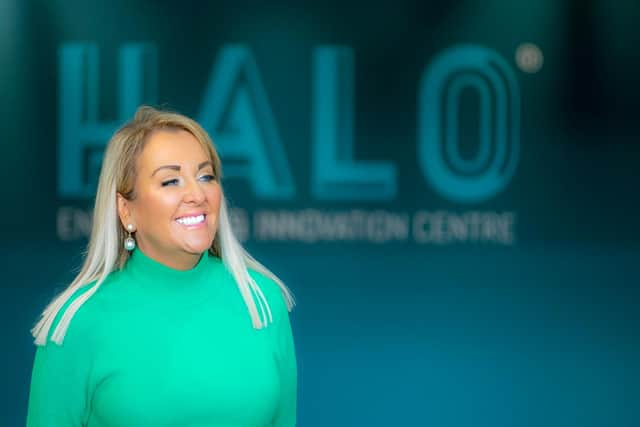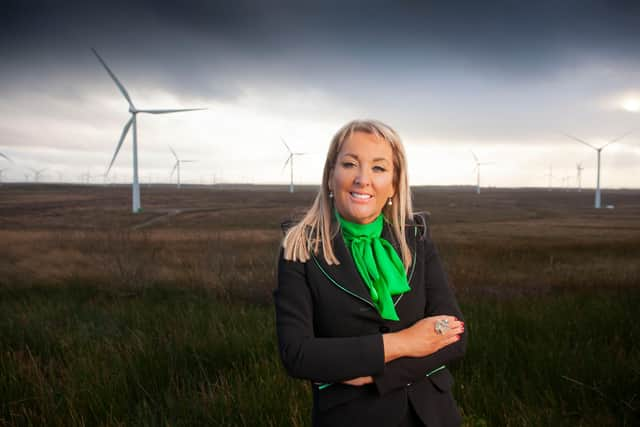The Big Interview: Marie Macklin, founder of the Halo Urban Regeneration Company
The first of these is in her Kilmarnock hometown on a site formerly home to a Johnnie Walker bottling plant, now creating a “dynamic commercial, educational, cultural, leisure and lifestyle quarter of the town”.
The businesswoman’s career includes a stint at Royal Bank of Scotland, but she later switched to the family business, namely property development and investment company Klin Group.
Advertisement
Hide AdAdvertisement
Hide AdShe has been garlanded with a host of accolades since, such as in 2014 being awarded a CBE for services to economic regeneration and entrepreneurship in Scotland, named Female Business Leader of the Year at the Scottish Business Awards in 2016, Scotland’s non-executive director of the year in 2017, and the following year accepting an honorary degree from Glasgow Caledonian University, making her a Doctor of Business Administration.


It is a “privilege” to receive such awards, she says, but cites her involvement in Klin’s deal to bring the first Morrisons supermarket to Scotland as “probably the most life-changing” moment in her career.
“That and, of course, the decision to take on the Johnnie Walker site and build a £63m regeneration project with world-class facilities... That’s the moment that rewrote the rest of my life.”
The first phase of Halo Kilmarnock Digital Cyber Innovation Park – the HEIC – has been some 13 years in the making. Can you explain more about the journey to that moment, and what you would like to see Halo Kilmarnock achieve long term, including its environmental targets in the wake of COP26?
This has been a long and rocky road for sure, with more twists and turns than an Ayrshire B road. Of course, it started when Diageo decided to close the Johnnie Walker bottling plant in Kilmarnock in 2009. It was a massive blow to the community, many of whom had seen generations work there, and it came with 700 job losses. But close it they did and, once the politicians had come and gone, all that was left was a 28-acre brownfield site and the ghosts of those workers.


So, I decided that this shouldn’t, indeed couldn’t, be the end and in 2012 we took control of the site, sold by Diageo for £1. Then the hard work really began. I was determined that whatever we replaced Johnnie Walker with would be decided by the community itself and we consulted extensively with them before arriving at The Halo vision – a dynamic commercial, educational, cultural, leisure and lifestyle quarter where people could “live, work, learn and play”.
And so was born the vision for The Halo, to set the standard for low-carbon energy sites across the UK by building a sustainable community, powered by renewable energy in a state-of-the-art environment for entrepreneurs specialising in green growth.
The biggest issue we faced – and it’s one that towns across Scotland and further afield struggle with – is that market failure in dormitory towns means the finance houses aren’t interested in investing. We were fortunate to receive funding [of £11m] to get Phase I – The HEIC – completed, and it will open its doors soon.
Advertisement
Hide AdAdvertisement
Hide AdFor all the good things that came out of COP26, I have a lingering worry that unless the finance houses get their act together and invest in our towns, Scotland can’t reach its 2045 net-zero targets. Mark Carney, as part of the Glasgow Financial Alliance for Net Zero, announced a £100 trillion plan to fund technologies that lower and eradicate carbon emissions. I’d love Mr Carney to use this plan to invest £100m in the Halo.
The opening of the HEIC was delayed – to what extent was the pandemic a factor in this?
The real question I often ask myself is how on earth did we manage to build the HEIC in the middle of a pandemic? It was delayed by ten months or so, but I really think that’s a great achievement. It also gave us the time to ensure that we were sharply focused on The Halo’s green credentials – in the depths of lockdown, The Halo has invested almost £1.5m in high-tech, smart-energy equipment.
Covid continues to cast a shadow over the development as employers are required to enable working from home, but we’ll continue to play safe, play wisely, and play to win.
I hope that the potential 150 or so businesses on our 15,500-square-foot #RockMe trading floor, who will create employment through digital and cyber technologies built around health, energy and enterprise, will be allowed to fill those desks before too long.
In fact, alongside some of our partners, we’re planning to launch a Green Growth Accelerator Unit at the HEIC, backed by a green investment fund, designed to attract not only Scottish businesses but companies from outside Scotland, so that may well produce some investment opportunities both for me and others.
You have a key focus on helping female entrepreneurs – noting that they are still the minority when it comes to business-founders. What approach do you take to mentoring them?
Women are still in the minority when it comes to start-ups, but the balance is better than it once was. I’ve been lucky enough to work with some exciting and creative women entrepreneurs, such as Leah Hutcheon at [smart scheduling system firm] Appointedd, and I’ve taken the view that the best support I can give them is to share my experiences and my contacts with them. I like to think that’s made a difference for the women I’ve worked with.
Advertisement
Hide AdAdvertisement
Hide AdBut there are some young men – boys even – who I’ve met through my work with Ayrshire schools and who have great ideas too. I’m hopeful that our Halo #Rock Me initiative, where we attract these young entrepreneurs – male and female – to locate at the Halo and benefit from the support offered by our partners such as Barclays Eagle Lab, law firm Anderson Strathern, accountancy business AAB, Scottish Enterprise, CommsWorld and ScottishPower (which is our Platinum Partner), will provide yet more support for Scotland’s next generation of change-makers.
You’ve talked about growing up seeing deprivation first-hand, while your father was an entrepreneur – to what extent did both of these fuel your ambition and define your career?
My dad was a brickie. And he worked hard for everything he ever achieved. He even built some of the buildings at the Johnnie Walker plant. And it was this work ethic that he instilled in me from a young age. It was therefore no surprise to me that from his bricklaying beginnings he hauled himself up to start a building company called the Klin Group, which became a developer of urban brownfield sites.
Growing up in Kilmarnock, I witnessed first-hand its decline at the hands of politicians of all parties who presided over the demise of the coal mines in Ayrshire and of industry in general. I do hope that as we, correctly, move away from our reliance on oil and gas to meet our energy needs that today’s politicians aren’t going to allow history to repeat itself.
Who do you admire in Scottish business?
Lord Willie Haughey and his wife, Lady Susan, have been friends of mine for years. But not just friends – I admire their approach, which is local first, then national, then international. And all the while supporting communities both at home in Glasgow and further afield.
I’m a great admirer of Sir Tom Hunter too – a man who thinks big but never forgets his Ayrshire roots in Cumnock.
And my good pal John McGlynn, the businessman from Paisley who made his fortune in car parks and still supports Scottish businesses through his investment vehicle Scottish Capital.
East End of Glasgow, Cumnock and Paisley – all three of these business-leaders are from hard-working Scottish communities.
Advertisement
Hide AdAdvertisement
Hide AdLooking at the Halo Urban Regeneration Company more broadly, which has projects elsewhere in the UK, can you highlight key current activity and the organisation’s ultimate aims?
My main aim has been to get the HEIC opened as soon as possible. Then we will embark on Phases II and III of the Halo Digital and Cyber Innovation Park in Kilmarnock, bringing 210 smart homes of the future; a wave surf pool and the digital high street of the future; a children’s innovation and learning hub; a virtual-reality education and gaming hub, and a low-carbon electric vehicle transport hub; light manufacturing units with live/work units built in and so much more to Kilmarnock.
But The Halo model is not restricted to Ayrshire. To some extent this is just the test bed for Halo developments elsewhere in the UK and internationally where we can bring such an offering to deprived areas of underinvestment and make the hearts of local communities sing there too.
With high-profile guests recently visiting from Israel and Spain and planned visits to the US, we see the Halo as a place to collaborate with the rest of the world.
Watch this space for an announcement on another venture in Scotland, and some other exciting projects in development outside the UK. I think this is what they call the Halo effect!
A message from the Editor:
Thank you for reading this article. We're more reliant on your support than ever as the shift in consumer habits brought about by coronavirus impacts our advertisers.
If you haven't already, please consider supporting our trusted, fact-checked journalism by taking out a digital subscription.
Comments
Want to join the conversation? Please or to comment on this article.
